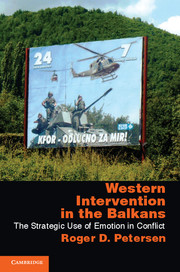Book contents
- Frontmatter
- Contents
- Acknowledgments
- Part 1 Background and Theory
- Part 2 Cases and Tests
- 7 Background to Western Intervention in the Balkans
- 8 The Case of the Roma in Kosovo
- 9 Background to Kosovo
- 10 Waiting for the West
- 11 Kosovo Intervention Games, I
- 12 Kosovo Intervention Games, II
- 13 Kosovo Conclusions
- 14 South Serbia
- 15 Macedonia
- 16 Bosnia
- 17 Montenegro
- 18 Conclusion
- Appendix A A Note on Names
- Appendix B Alternative Arguments
- References
- Index
- References
17 - Montenegro
from Part 2 - Cases and Tests
Published online by Cambridge University Press: 05 June 2012
- Frontmatter
- Contents
- Acknowledgments
- Part 1 Background and Theory
- Part 2 Cases and Tests
- 7 Background to Western Intervention in the Balkans
- 8 The Case of the Roma in Kosovo
- 9 Background to Kosovo
- 10 Waiting for the West
- 11 Kosovo Intervention Games, I
- 12 Kosovo Intervention Games, II
- 13 Kosovo Conclusions
- 14 South Serbia
- 15 Macedonia
- 16 Bosnia
- 17 Montenegro
- 18 Conclusion
- Appendix A A Note on Names
- Appendix B Alternative Arguments
- References
- Index
- References
Summary
Montenegro is a tiny country. Yet it provides some key methodological insights for this study. The Montenegrin case clearly differs from the rest of the former Yugoslavia in terms of violence and provocations. This small multiethnic entity did not experience protracted war (as in Croatia, Bosnia, and Kosovo) or violent escalation (as in South Serbia and Macedonia) or even a short secessionist war (as in Slovenia). Even as Montenegro seceded from its confederation with Serbia, politics remained remarkably civil. For the first time, part of the former Yugoslavia split off without bloodshed. The contrast with Bosnia could not be starker.
During the 1990s, political actors inside Montenegro looked to the West for signals to help guide their strategies. After the Kosovo intervention and the subsequent deepening of commitment to the region, the West brokered two major agreements: (1) the Belgrade Agreement of March 2002, which created the State Union of Serbia and Montenegro, a temporary political arrangement aimed to ease the possible separation of Montenegro from Serbia with minimum disruption to regional politics; (2) the 2001 Ulcinj Agreement, which, similarly to the Ohrid and Konculj agreement, aimed to address the status concerns of Montenegro's Albanian population. The implementation of both of these accords went according to plan. In terms of the more general dependent variable, the West accomplished its goals. In terms of the specific dependent variable, political actors did not meet Western intervention with violent tactics or even engage in significant nonviolent provocations.
- Type
- Chapter
- Information
- Western Intervention in the BalkansThe Strategic Use of Emotion in Conflict, pp. 269 - 289Publisher: Cambridge University PressPrint publication year: 2011



